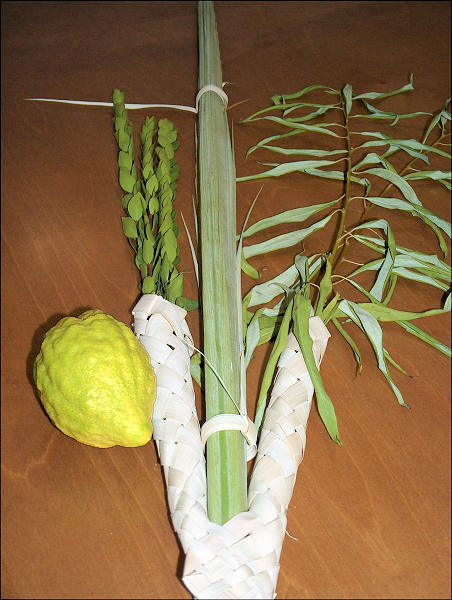For the week of October 22, 2016 / 20 Tishri 5777
Sukkot
Torah: Shemot/Exodus 33:12 – 34:26; Bemidbar/Numbers 29:26-34
Haftarah: Ezekiel 38:18 – 39:16
Download Audio [Right click link to download]
And you shall take on the first day the fruit of splendid trees, branches of palm trees and boughs of leafy trees and willows of the brook, and you shall rejoice before the LORD your God seven days. (Vayikra/Leviticus 23:40)
This week’s readings occur during the Festival of Sukkot (English: Tabernacles or Booths). Sukkot is a week-long thanksgiving holiday that commemorates Israel’s forty-year wilderness wanderings. It is fitting that God chose to connect gratitude with dependency. No matter how prosperous or secure we would be, every year we were to take time to remember what it was like when we were completely dependent upon God. This helped to reinforce the essential truth that whatever we have ultimately comes from God. During the wilderness years, that was fairly easy to see. But when we farm our own land or receive our provision via direct deposit, that connection is eclipsed by the many conduits our provision travels through. But if God doesn’t provide the rain and sunshine as well as bless all the various natural and man-made processes along the way, we would have nothing.
The years in the wilderness are vividly brought to mind through living for seven days in temporary shelters called sukkot (one sukkah, many sukkot; hence the name of the festival). The reminiscence of our history is then drawn to the present each year by rejoicing as we hold four specified organic items. The four items according to the Torah are in Hebrew p’ri etz hadar (the fruit of beautiful trees, traditionally an etrog, which looks like a large waxy lemon), kapot t’marim (branches of the palm tree, referred to as a lulav), anaph etz avot (leafy boughs of the myrtle tree), and arvei nahal (willow branches). The myrtle and willow branches are placed in a special holder connected to the lulav and are held together with the etrog. Special blessings are recited while holding the four items.
These items represent God’s blessing and provision in the present. What is instructive for us is that our gratitude, while being a spiritual activity directed to God, is based on that which is tangible. In the case of the ritual, it is a fruit and branches of various trees, but they represent the abundance of good bestowed upon us.
For many, spiritual activities are detached from the physical world in which we live – a world too confusing to be acknowledged in this way. The presence of hardship and suffering might cloud our understanding of God, preferring to keep him alienated from our broken world, or perhaps we are unable to associate material pleasures with God’s goodness due to our perception of the divine. Because of either of these or both, we tend to detach our spirituality from the real world, the world which God himself created and purposely placed us in.
Sukkot reconnects us to the tangibles of God’s provision. Instead of attempting to solely focus on abstract notions such as love, forgiveness, and goodness (which are also part of the real world God made), holding actual things gives us the opportunity to realize that the attributes of the intangible God are made known through the tangible items he made and has provided for us.
By holding the four items and rejoicing before the Lord, it is as if we are holding our houses and cars and mobile phones, not to mention our fridges and freezers full of food, or our spouses and children and siblings, or even ourselves, who because of God’s help have lived to see this day.
All scriptures, English Standard Version (ESV) of the Bible

